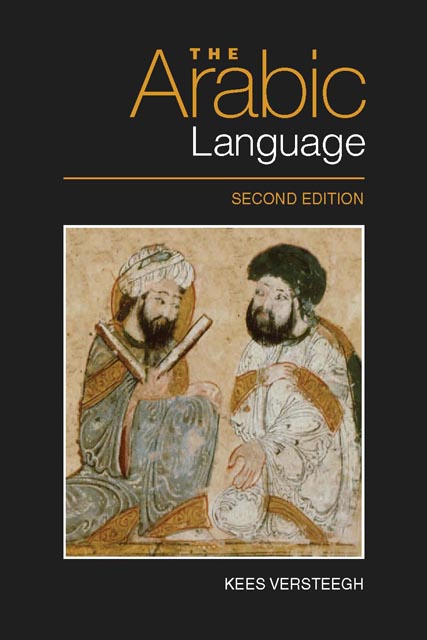Book contents
- Frontmatter
- Contents
- Preface to First Edition
- Preface to Second Edition
- List of Figures and Maps
- List of Tables
- Note on Transcription and Glossing
- 1 The Study of Arabic in the West
- 2 Arabic as a Semitic Language
- 3 The Earliest Stages of Arabic
- 4 Arabic in the Pre-Islamic Period
- 5 The Development of Classical Arabic
- 6 The Structure of Arabic
- 7 The Arabic Linguistic Tradition
- 8 The Emergence of New Arabic
- 9 Middle Arabic
- 10 The Study of the Arabic Dialects
- 11 The Dialects of Arabic
- 12 The Emergence of Modern Standard Arabic
- 13 Diglossia
- 14 Bilingualism
- 15 Arabic as a Minority Language
- 16 Arabic Pidgins and Creoles
- 17 Arabic as a World Language
- Bibliography
- List of Abbreviations
- Index
12 - The Emergence of Modern Standard Arabic
Published online by Cambridge University Press: 18 November 2022
- Frontmatter
- Contents
- Preface to First Edition
- Preface to Second Edition
- List of Figures and Maps
- List of Tables
- Note on Transcription and Glossing
- 1 The Study of Arabic in the West
- 2 Arabic as a Semitic Language
- 3 The Earliest Stages of Arabic
- 4 Arabic in the Pre-Islamic Period
- 5 The Development of Classical Arabic
- 6 The Structure of Arabic
- 7 The Arabic Linguistic Tradition
- 8 The Emergence of New Arabic
- 9 Middle Arabic
- 10 The Study of the Arabic Dialects
- 11 The Dialects of Arabic
- 12 The Emergence of Modern Standard Arabic
- 13 Diglossia
- 14 Bilingualism
- 15 Arabic as a Minority Language
- 16 Arabic Pidgins and Creoles
- 17 Arabic as a World Language
- Bibliography
- List of Abbreviations
- Index
Summary
Introduction
In 1798, Napoleon Bonaparte's brief expedition to Egyptbrought this province of the Ottoman Empire intodirect contact with Western Europe. This marked thebeginning of a period in which European culture, atfirst primarily from France, but later from Englandas well, began to infiltrate the Arab world. Atfirst, the reception of new ideas was promoted bythe government: Muḥammad ʿAlī, who governed Egyptfrom 1805 until 1848, stimulated the translation ofbooks and articles from French, mostly on technicalsubjects, but political and cultural topics werealso included. In this way, the concepts of theFrench Enlightenment became part of the intellectualatmosphere of the country. The introduction of newpolitical ideas stimulated the rise of Arabnationalism, which in the second half of thenineteenth century centred around the position ofArabic as the language of the Arab world. At thesame time, the confrontation with Western ideas ledto a debate about the compatibility of these ideaswith the tradition of Islam, and, on a linguisticlevel, about the capacity of the Arabic language toexpress the new notions. In this chapter, we shalldeal with four topics: the position of Arabic in thenineteenth century; the adaptation of Arabicvocabulary to the modern period; the reform ofgrammar; and the changes in the structure andphraseology of the language.
The rebirth of Arabic
When the French conquered Egypt, the Egyptian writeral-Jabartī (d. 1825), who witnessed the invasion,wrote an account in which he informed hiscompatriots about the political situation in Europeand the relations between the European nations. Forthe first time, political notions and institutionsthat were alien to the Islamic point of view had tobe described in terms that were comprehensible to aMuslim audience. Throughout the nineteenth century,Arabic translators were active as intermediaries whoattempted to express the notions of one culture inthe language of the other (cf. Ayalon 1987). It was,for instance, hard to find an Arabic equivalent forthe European notion of ‘constitutionalgovernment’.In some translations, ‘constitutionalmonarchy’ became a malakiyyamuqayyada (after the French monarchie limitée), that is,a monarchy that was limited by laws, in the MiddleEastern context almost a contradiction in terms.
- Type
- Chapter
- Information
- The Arabic Language , pp. 221 - 240Publisher: Edinburgh University PressPrint publication year: 2014



